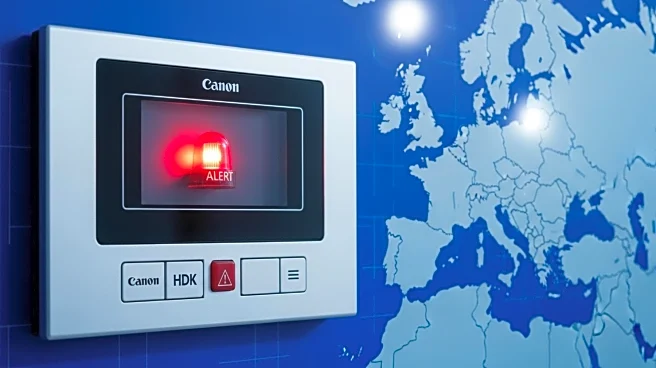What's Happening?
Ursula von der Leyen, President of the European Commission, has emphasized the growing security threats posed by Russia to the European Union. During an EU summit in Copenhagen, von der Leyen pointed out a pattern of Russian provocations, including drone incursions in Poland and violations of Estonian airspace by Russian fighter jets. The summit, hosted by Denmark's Prime Minister Mette Frederiksen, focused on enhancing Europe's defense capabilities by 2030. The discussions included plans for a 'drone wall' to detect and neutralize aerial threats and a comprehensive defense system for the EU's eastern borders. The EU is also considering a €140 billion reparations loan for Ukraine, funded by Russia's frozen assets, although this proposal faces opposition from some member states.
Why It's Important?
The emphasis on Russian threats underscores the EU's strategic pivot towards bolstering its defense mechanisms in response to perceived aggression. This development is crucial for the security of EU member states, particularly those on the eastern front, who are directly exposed to potential Russian military actions. The proposed defense initiatives, if implemented, could significantly enhance the EU's ability to deter and respond to threats, thereby stabilizing the region. The financial implications of the reparations loan for Ukraine also highlight the EU's commitment to supporting Ukraine amidst ongoing conflict, although it raises legal and diplomatic challenges regarding the use of frozen assets.
What's Next?
EU member states are expected to deliberate further on the proposed defense strategies and the reparations loan for Ukraine. The outcome of these discussions will likely influence the EU's defense posture and its financial support mechanisms for Ukraine. Additionally, the EU's ability to reach a consensus on these issues will be a test of its unity and resolve in the face of external threats.
Beyond the Headlines
The EU's focus on defense spending and security measures reflects a broader shift in its policy priorities, potentially leading to increased military collaboration among member states. This shift may also influence the EU's diplomatic relations with Russia and other global powers, as it seeks to balance deterrence with diplomatic engagement.









